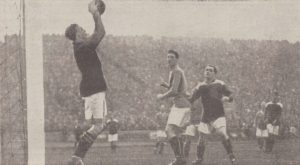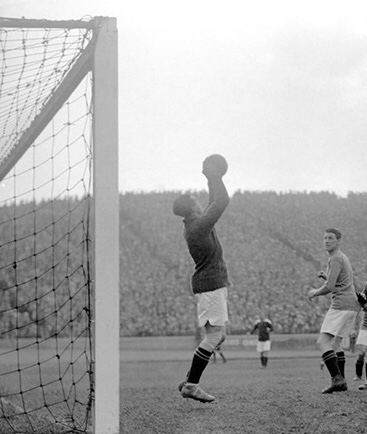BENJAMIN HOWARD BAKER – LAST OF THE CORINTHIANS
BY Vince Cooper
There are other sporting polymaths featured on our website with ‘Corinthian’ greats like Max Woosnam, C. B. Fry and Cuthbert Ottaway among those written about.
There are also plenty of articles about goalkeeping heroes, from ‘Fatty’ Foulke all the way through to more recents greats like Lev Yashin, Gordon Banks and Pat Jennings
But one other man who covers both of these areas, and certainly seems to have led a fascinating life is Benjamin Howard Baker, star goalkeeper (at both football and water polo) and Olympic high-jumper
In football Howard Baker, a Liverpudlian (he was born close to Anfield in 1892), started out as a centre-half playing for Marlborough Old Boys of Liverpool, Liverpool Balmoral and Northern Nomads. He was considered good enough to be selected as an outfield player to take part in England amateur trials whilst playing for Blackburn Rovers.
High-jumper
It was as a high jumper that Howard Baker (some reports call him Benjamin Howard-Baker and his original census listing at birth called him simply ‘Benjamin Howard’) first came to fame. His father took him to the Liverpool Harriers Athletic club in an effort to ‘tire him out and stop him jumping about’. It didn’t really work. He won the AAA high jump title at Huddersfield in 1910 as an 18-year-old and would go on to capture the crown twice more before the 1st World War and three times after it.
Alongside those six AAA titles, Howard Baker also won the Northern high jump title seven times.
Representing his country
He was chosen to represent his country in the high jump at the 1912 Antwerp Olympics where he finished 11th, and the 1920 Stockholm games in the high jump (6th), triple jump (8th) and standing jump. His high jump of 6ft 5in at Huddersfield Cricket Ground in 1921 was a British record that stood for 21 years whilst he was also an excellent long-jumper.
And even in the field of athletics, Howard Baker’s skills weren’t limited to jumping. He won the discus event at the 1920 Northern Counties Championship and the 120 yards hurdles at the same championships in 1921 and also competed in javelin and shot putt for his club.
An ankle injury suffered when on mine-sweeping duty on a Q boat during his time in the Navy in the 1st World War forced a position change in football and he became a goalkeeper. But the change of role, rather than proving a setback, led to Howard Baker being even more successful.
His previous experience as an outfield player gave Howard Baker the ability and confidence to come out of his area, a rarity among goalkeepers of the time and he also possessed prodigious throws and kicks enabling him to start his team’s attacks.
Immediately after the war Howard Baker joined Preston North End before moving on to Liverpool. He was at Anfield only briefly, no doubt picking up some tips from the great Elisha Scott, and then after an excellent performance in a reserve derby match, joined Everton for whom he played two league matches, against Chelsea and Tottenham Hotspur. In both matches he won widespread praise and according to contemporary reports, was ‘heartily cheered’.
Whilst making his mark with top flight clubs he continued his amateur career, leaving Northern Nomads (with whom he had won the Welsh Amateur Cup) to join the famous Corinthian F.C.
Corinthian 1921
It was while he was on Everton’s books, and also those of Corinthian, that Howard Baker received his first England call-up.
The international debut came in May 1921 and was part of his country’s end-of-season tour. Playing Belgium in Brussels, he kept a clean sheet as goals from Charles Buchan and Harry Chambers guided England to a 2-0 win.
In 1921 he left Liverpool for London for business reasons and joined Chelsea. He quickly became the first-choice number one at Stamford Bridge making 92 appearances in five years and he also proved very popular with the West London fans.
A programme cover showing some of Benjamin’s exploits
In his first season with Chelsea the team were playing Bradford City at home and the game was scoreless. The Blues were awarded a penalty and Howard Baker, on his sixth start for the club insisted on taking it. He scored and it proved to be the only goal of the game. Later in the season the Blues were awarded a penalty against Arsenal and he again took on the responsibility. This time he missed and was thereafter relieved of spot-kick taking duties.
On international duty
In 1924 whilst turning out for his ‘other’ team Howard Baker participated in a shock. Corinthian were drawn against First Division Blackburn Rovers in the first round of the F.A. Cup with the tie played at Crystal Palace in front of 20,000 fans. The goalkeeper, who had played for Chelsea in a 2nd Division match the previous weekend, lined up alongside two other current England internationals in Alfred Bower and Jackie Hagan, whilst former England star Norman Crook and Scottish cap John Morrison were also in the team.
It was Hagan who set up Graham Doggart, a future chairman of the Football Association, to score the only goal of the game after 15 minutes as the amateurs ousted the pros. Corinthian went on to find the 2nd round a step too far and were soundly beaten by West Bromwich Albion
Patrolling the goal at Stamford Bridge
Howard Baker’s recall to the national team came in October 1925 when he was chosen, at the age of 33, to face Northern Ireland in Belfast. He maintained his record of not conceding an international goal as the game finished goalless.
Alongside those two caps for the England professional team (although he was an amateur) he also made 10 appearances for the Amateur side.
A caricature
He made his last start for Chelsea in November 1925 before moving back up north when Everton were in the midst of a goalkeeping crisis to resume his career at Goodison. But The Toffees were struggling mightily at the time and despite some fine performances, including in a 1-0 win over Liverpool in front of 43,973 fans and even a spell as captain, he was eventually dropped in favour of Arthur Davies. A one-match spell at Oldham Athletic followed and he did get to make a farewell appearance at Goodison when keeping goal for Corinthians. Everton won the game 1-0 but according to reports the score line would have been much greater were it not for the ‘keeper’s brilliance.

Baker grabs a cross against Middlesbrough
In October 1925 Howard Baker was chosen for the Amateur side that faced the Professionals in that year’s Charity Shield game at White Hart Lane. With four goals from fellow Corinthian Claude Ashton and two more from Army man Fusilier Frank Macey, the Amateurs won 6-1 with a performance which led to them being called ‘As fine an Amateur side as we have seen for some seasons’.
For his skill on the football pitch and athletics field alone Benjamin Howard Baker deserves recognition as a great all-round sportsman. But his abilities went way beyond these two sports. A more than accomplished tennis player he won the Welsh covered courts doubles title in 1932 (at 40 years old) and tried, albeit unsuccessfully, to qualify for Wimbledon on a couple of occasions. He was a member of the Lancashire district Water Polo team (perhaps unsurprisingly, as a goalkeeper) and was known for his abilities at ‘trick diving’. He also played cricket for the Lancashire Second XI.
In business circles Howard Baker was also highly regarded, taking over his father’s wholesale drugs, cleaning and soap (the company manufactured ‘Aunt Sally’ one of the most popular deodorants of the day) concern and running it successfully whilst finding time to pursue his various sporting passions.
Lily Langtry
It is difficult to know what to put first in Benjamin Howard Baker’s list of sporting achievements. And also impossible to predict just how good he might have been had he devoted himself to sport full time rather than just as a pastime. But, had he been a professional sportsman it’s unlikely that he would have got the chance to display his showmanship and impress the famous socialite Lily Langtry at a social event in Paris where he jumped to kick a chandelier.
In 1973 he attended a Merseyside derby at the age of 81, still bemoaning the fact that he had been unable to perform the newly-popular ‘Fosbury Flop’ during his high jump career.

Benjamin in later life
By the time he passed away, aged 95 in 1987 at his home at Warminster, Wiltshire, Benjamin Howard Baker could truly be called the ‘Last of the Corinthians’.
How he found the time to be that good at that many sports, all of which he regarded as pastimes whilst running a hugely successful business empire is a mystery which is unknown to sportsmen of today, especially as everyone now tries to be good at just one. One thing is for sure, when great sporting all-rounders are discussed, Benjamin Howard Baker must be in the conversation









